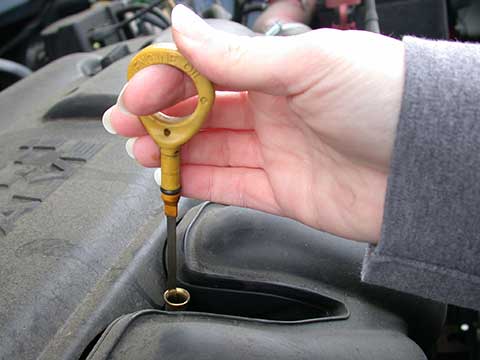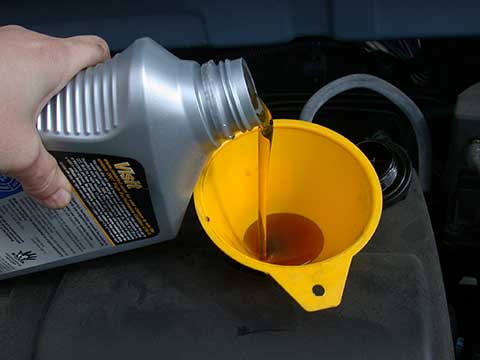It is a known problem that some engines consume oil, the fact that internal combustion engines consume oil in a small amount is normal, the problem arises when they consume excess oil.
To summarize the main causes for which the engine consumes oil, these would be:
- Excessive engine wear;
- Defective segments;
- Defective gas scrubber;
- Using poor quality oil;
- Oil thinner for many miles;
I want to specify that any engine consumes oil, this aspect is also mentioned by the car manufacturers, even if it is new, it will tend to consume a small amount of oil which is considered a normal thing by the manufacturers, the average being consumption of 1 liter every 15,000 km (9300 miles) traveled, this even representing the difference between the minimum and the maximum amount shown on the dipstick, except for smaller engines where that difference is less than 1 L or large engines where that difference is greater than 1 L
So it is not a problem if your engine consumes somewhere at 0.3 L, 0.5 L, 0.8 L, 1 liter on average. There is a gas scrubber, there is a valve, there is a crankcase gas vent, it is normal to create certain gas pressure in the engine. Also, it is normal for some of the very little oil left on the inside of the cylinder walls after the piston goes down, the squeegee segment will lead the remaining oil down to the oil pan, but there will still be a very fine oil remnant, which can be removed after burning from the internal combustion engine.
Tip! If too much oil remains in the cylinder walls it means that the walls either have too much wear or are locked. Thus, an unwanted oil film will remain inside the cylinders. Because of this, oil consumption will increase, engine power will decrease and pollutant emissions will increase.

Contents
When excessive engine oil consumption occurs?
Opinions about the time when there is talk of excessive oil consumption differ widely in practice and from country to country. The movable components of an engine, especially the pistons and valves, are not 100% gas-tight or oil-resistant, due to the necessary constructional play.
This causes low but permanent oil consumption. In the combustion chamber, the oil film on the surface of the cylinders is additionally subjected to very high combustion even on large surfaces. This causes the engine oil to evaporate, burn and be released into the environment with the exhaust gases. Service books and user manuals often indicate the maximum permissible oil consumption of an engine.
If no data are available from the manufacturer, oil consumption of a maximum of 0.25 to 0.3% for utility vehicles and up to 0.5% for buses can be taken into account. In modern car engines, oil consumption is generally below 0.05%, but the maximum allowable consumption is 0.5% (all percentage values refer to the actual fuel consumption).
For older engines, stationary engines and those used under special conditions, normal oil consumption may be higher. By comparing the actual oil consumption with the maximum allowable consumption, a decision can be made regarding any necessary auxiliary measures.
Diesel engines consume more engine oil than petrol engines. Turbocharged engines need more engine oil than those without turbochargers because of the lubrication of the turbocharger. From a technical point of view, oil consumption is at its lowest after the engine running phase and increases through wear, throughout the life of the engine.
Wear inside the engine thus affects all components to the same extent. Partial repairs, such as changing only pistons or piston segments, will not, in most cases, lead to a significant improvement in oil consumption.
Example of calculation for oil consumption in a car
- A car consumes about 100 km approx. 8 liters of fuel. This results in 80 liters of fuel per 1000 km.
- • 0.05% of 80 liters of fuel means 0.04 liters of oil consumed / 1000 km
- • 0.5% of 80 liters of fuel means 0.4 liters of oil consumed / 1000 km
Example of calculation for oil consumption in a utility vehicle
- A utility vehicle consumes about 100 km approx. 40 liters of fuel. This results in 400 liters of fuel per 1000 km.
- • 0.25% of 400 liters of fuel means 1 liter of oil consumed / 1000 km
- • 0.5% of 400 liters of fuel means 2 liters of oil consumed / 1000 km
What happens to a car that consumes excessively oil?
The catalytic converter and the particulate filter will wear much faster
For newer engines, with a particulate filter, in particular, the manufacturers require some oils that have in their composition sulfated ash content of about 0.3%, 0.5%, 0.7%, but 0.5% is considered a very good level.
As for gasoline engines, this sulfated ash content can be more than about 1.2%
If the engine consumes oil, this concentration of sulfated ash goes crazy, increases greatly, and the particulate filter or catalyst will be destroyed in the shortest time.
Therefore, the catalyst will be worn much faster. How do you realize it will be worn? Well, it will smell ugly at the exhaust and the pollutant emissions test will show much higher values than those allowed.
At an oil consumption greater than 1L / 1000 km (620 miles) then blue smoke will be observed emitted on the exhaust.

The engine will lose power
You will not want to burn the oil in the combustion chamber, if this happens, the engine power will drop significantly. Normally, fuel is burned with air, a mixture of air-fuel, the oil should not be burned because, first of all, it is toxic to the environment, secondly it accumulates carbon deposits inside the cylinders on the valves and so on
The car emits blue smoke on the exhaust
Sometimes smoke can also be white, but this can be a more common cause when the engine burns antifreeze especially when there is a faulty cylinder head gasket.
A car that has blue smoke on the exhaust then the hydrocarbons level rises to several thousand and the concentration of carbon monoxide will increase greatly due to the fact that burning the fuel will be incomplete and you may suffocate if you are in traffic behind a car which gives off blue smoke.
To help with oil consumption, various additives that have a good efficiency can be used, I refer in particular to the Liqui Moly oil additive. Using this additive, the oil consumption was reduced even 3-4 times. Use this additive only if the oil consumption is not caused by internal engine problems.
Keep in mind, however, that the oil additive is a temporary solution and in order to stop the oil consumption the problem must be inspected more thoroughly and it may even consist of a rather costly and durable repair, being the best-recommended solution only if you want to keep the car more time.
Conclusion
Do not neglect the excessive consumption of oil because it can destroy your engine, you will cause very large deposits in the combustion chamber on valves and others, pollution will increase significantly, it will wear the particulate filter, and the catalytic converter.
